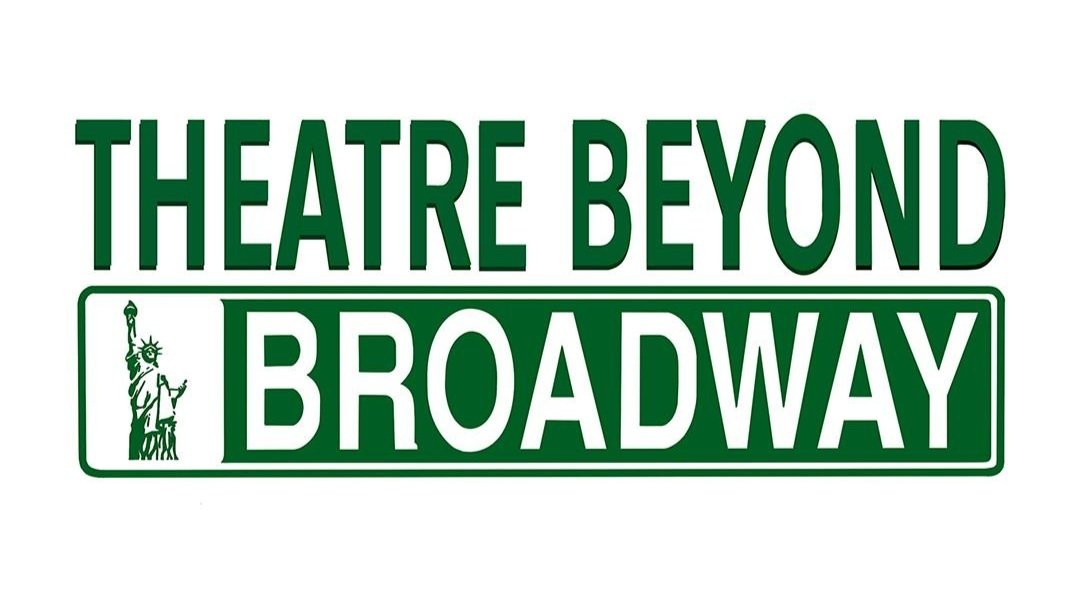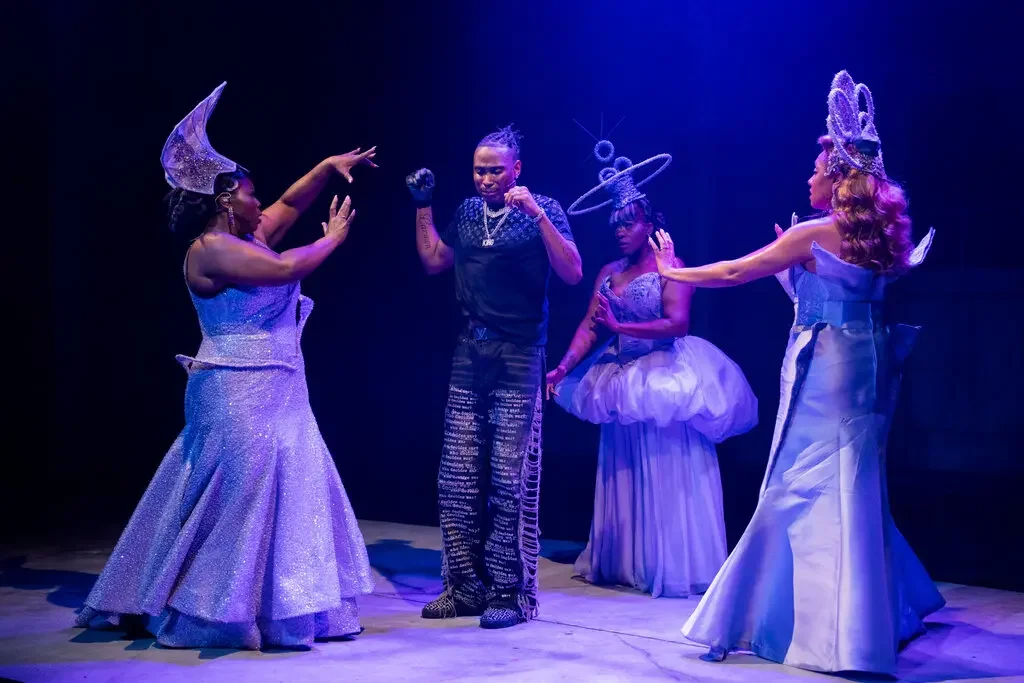Oh Happy Day!
By Jordan E. Cooper; Original Songs by Donald Lawrence; Directed by Stevie Walker-Webb
The Martinson Theater at The Public Theater | 425 Lafayette Street, NY, NY 10003
October 2 - November 2
Photo Credit: Joan Marcus
What would you do if offered the tantalizing proposition of a second chance? Not a simple do-over, mind you, but a spiritually freighted, divinely orchestrated resurrection—a metaphysical mulligan with your immortal soul hanging in the balance. Would you make peace with those who've wounded you, those familiar saboteurs whose betrayals are etched into your emotional DNA? Or, like so many of us, would you stumble, once again, into the same cyclical family dysfunction that shaped you?
This is the Sisyphean quandary faced by Keyshawn, the prodigal son in Oh Happy Day!, Jordan E. Cooper’s new play—part Southern Gothic family reckoning, part queer resurrection fantasia—now receiving an audacious production at the Public Theater under the direction of Stevie Walker-Webb.
If the premise strikes you as wildly baroque, that’s because it is. The piece opens with a literal bang: Keyshawn, a Black, queer, Southern sex worker, is shot dead—only to find himself bewilderingly alive at his estranged father’s birthday barbecue in Laurel, Mississippi, a resurrection as sudden as it is disorienting. Is it a dream? A joke? A test? Cooper, ever the theatrical provocateur, gives us no easy answers—only divine instructions. Build a boat, he is told. The end is nigh. The flood is coming…Yes, that flood!
The conceit is both biblical and absurdist, and the set, designed by Luciana Stecconi with a keen eye for down-home authenticity, locates us squarely in the mythic domestic: a backyard barbecue in full bloom, framed by an Easter-egg-blue house with the number “735” above the door—a not-so-subtle nod to Genesis 7:5, in which Noah obeys God’s command to build an ark. But here the ark is metaphorical, spiritual, a vessel not only of salvation but of reconciliation. Can one gather their broken kin aboard such a craft? Can one forgive and be forgiven?
These questions are addressed in the central performance, which anchors Oh Happy Day! with an emotional immediacy that often outpaces the play’s shifting architecture. Armed with a wounded defiance and glitzy swagger (his costume, by Qween Jean, is a bedazzled proclamation of self) Jordan E. Cooper, serving here in dual capacities as both playwright and leading man, offers a portrayal of Keyshawn that is nothing short of raw, devotional, and almost painfully earnest. One might argue too earnest, if such a thing exists in a world that rarely rewards sincerity, particularly in the context of a young, gay, Black man grappling with God in the ruins of American spiritual life.
Cooper’s Keyshawn is not content with platitudes or performative forgiveness. His is a soul in open revolt, interrogating divinity with the fervor of a modern-day Job. “I just gotta know why,” he cries out, the question slicing through the air like a blade. “Why you put me through all this?” It is not a rhetorical query, nor a tidy dramatic device—it is the agonized wail of someone who has tasted too much sorrow too young, and who dares to hold the heavens accountable for their silence. There is a volatility in Cooper’s performance that both magnetizes and unsettles. He vibrates with the hurt of abandonment—by church, by father, by faith itself—and beneath his glitzy exterior lies a cauldron of rage and longing forever on the verge of boiling over. The monologues crackle with vulnerability, and in quieter moments, there is a haunted stillness, as if Keyshawn’s entire being is bracing for the next betrayal.
And let us not ignore the craftsmanship behind the curtain: Cooper, the dramatist, has gifted Cooper, the actor, with the role of a lifetime—a densely layered, deeply wounded figure whose emotional arc demands both ferocity and finesse. The result is a performance that feels almost too personal, too exposed, as if we are watching a man tear out pages from his own spiritual diary and set them aflame, one by one, before our eyes. In a theatrical landscape where guarded irony so often substitutes for emotional truth, Cooper’s unflinching sincerity comes as something of a beautiful radical act.
Keyshawn is tasked with convincing a deeply fractured family—Lewis, an alcoholic father emotionally detached from his son (Brian D. Coats, a study in quiet gravitas), Niecy, a dutiful yet emotionally exhausted sister (Tamika Lawrence, sturdy and compelling), and Kevin, her quietly exasperated teenage son (Donovan Louis Bazemore, charming in his exasperation)—to board a boat none of them can see, to escape a doom they refuse to believe in. And hovering above—or within—the action is God, played, in an inspired theatrical conceit, by multiple cast members, including Lawrence, who at one point twerks divinely atop a lawn chair. It is moments like these—absurd, irreverent, almost vaudevillian—that give the play its off-kilter pulse.
But let us not forget: this is a play with music. And so we are blessed, intermittently, by the presence of the “Divines”—three gospel-tinged angels named Holy (Tiffany Mann), Mighty (Sheléa Melody McDonald), and Glory (Latrice Pace)—whose radiant harmonies, courtesy of Donald Lawrence’s score, offer the production its most consistently transcendent moments. Under Adam Honoré and Shannon Clarke’s glowing, almost celestial lighting, they quite literally shine. Taylor J. Williams’ confident sound design captures every glorious note.
With all its pageantry and ambition, Oh Happy Day! is an outrageous affair. Like life, It careens tonally—from operatic familial shouting matches to surreal religious satire to moments of aching vulnerability—with a structural looseness that purposely resists cohesion. In Act I, we are given a brutal confrontation between Keyshawn and the Almighty, wherein the playwright wrestles openly with themes of spiritual abandonment, religious hypocrisy, and the trauma inflicted by the very institutions meant to save us. By Act II, we are back on earthly ground for a more conventional, though no less searing, showdown between Keyshawn and his estranged father—a man broken in ways we’ve seen before on American stages, and who, to his credit, does not ask for easy redemption.
Cooper’s previous work, Ain’t No Mo’, was a kaleidoscopic satire that danced on the knife’s edge between hilarity and heartbreak, ending not in catharsis but in discomfort—refusing to tidy up the mess of Black American existence for the sake of an audience’s peace of mind. Here, however, the impulse toward redemption feels more nuanced. One senses a deep tug-of-war between the playwright’s provocateur instincts and a creeping desire to uplift.
Under the direction of the ever-adventurous Stevie Walker-Webb, Oh Happy Day! traverses a vast and often unruly emotional terrain—careening from biblical allegory to domestic melodrama, from gospel-infused uplift to existential despair. Yet amidst its cacophony of themes and tonal pivots, the play orbits, unmistakably and unwaveringly, around one of humanity’s oldest and most agonizing theological riddles: What is the role of God in the face of unimaginable suffering? It is the kind of question that has kept philosophers and preachers pacing for centuries, and Cooper, for all his theatrical flamboyance, approaches it with a wounded reverence. The divine here is neither absent nor comfortably omniscient but, rather, exasperatingly cryptic. When God finally does speak—through the mouths of various characters in moments that vacillate between the sublime and the absurd—the Almighty offers not clarity, but koans; not deliverance, but metaphors. In any event we are using those Easter-egg-blue shingles to make that boat.
To the question of pain, abandonment, and the aching silence of the heavens, Oh Happy Day! replies with the scriptural admonition to “lean not on your own understanding.” It is a directive that feels both consoling and cruel in the moment, a divine shrug disguised as wisdom. But then, in what may be the play’s most oddly resonant moment of divine speechifying, God—yes, God—delivers a surprisingly poignant metaphor involving spilled milk and carpet cleaner. It is part parable, part stand-up routine, part therapy session, and like so much in this play, it walks the line between profundity and parody.
That it lands at all is a credit to Walker-Webb’s direction, which embraces the text’s wild fluctuations in tone with a kind of muscular grace. He allows the play to be what it is: messy, searching, overfull—and yet undeniably sincere in its cosmic questioning. This is not a production that seeks to answer the unanswerable; rather, it leans into the discomfort of uncertainty, where faith becomes not a solution but a posture, a performance, a plea.
If we ever needed proof that theater, at its best, should be more than balm, that it should be the wound and the knife, Cooper has given us this incredible Oh Happy Day! Yes, it is a “messy” play. But then again, so is resurrection. So is family. So is grace. If you came in looking for a calming revue of Edwin Hawkins spirituals, you came to the wrong theater.
Click HERE for tickets.
Review by Tony Marinelli.
Published by Theatre Beyond Broadway on October 18, 2025. All rights reserved.



